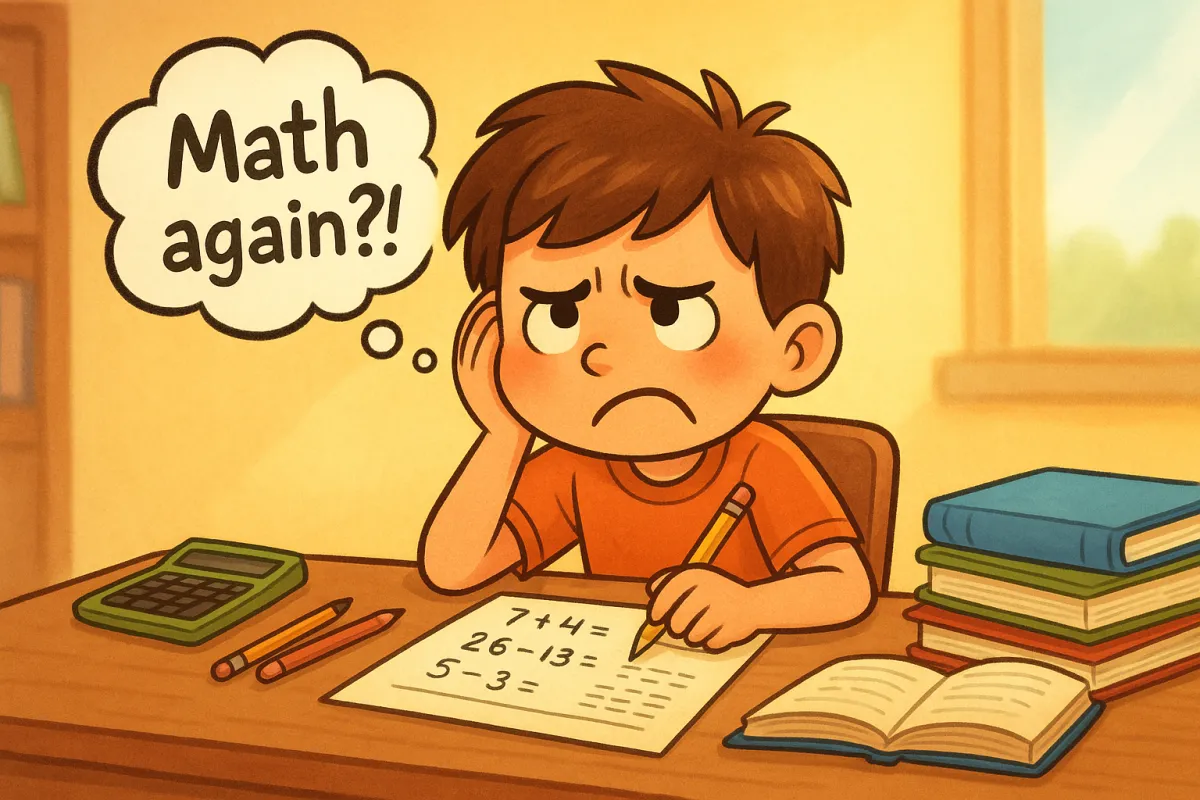
Why Does My Child Hate Math? 6 Stress-Free Ways to Build Confidence and Make It Fun
Why Does My Child Hate Math — And What Can I Do About It?
Spoiler: It’s not because numbers are evil.
If your child treats math like it’s broccoli-flavored toothpaste, you’re not alone. Math anxiety is real, and for many kids (and let’s be honest, a few adults), math can feel frustrating, confusing, or just plain boring. So what’s going on? Why the dramatic sighs at homework time? And more importantly — what can you do about it without turning your home into a full-blown math bootcamp?
Let’s break it down with a dose of empathy, some smart strategies, and maybe even a little laughter.
🚨 First, Don’t Panic
If your child says, “I hate math,” it doesn’t mean they’re doomed to a life of avoiding calculators and tax returns. It usually means something else:
They feel confused or behind
They’ve had a bad experience (a tough test, confusing lesson, or impatient adult)
They believe they’re just “not a math person”
Guess what? There’s no such thing as a “math person.” Just people who’ve had enough positive experiences with math to not be afraid of it.
So, take a deep breath. This isn’t a crisis — it’s an opportunity to shift the script.
😫 The Struggle Is Real — and Normal
Math can be hard because it builds on itself. If a kid misses one concept (like place value or multiplication), the next lesson can feel like trying to build a LEGO tower on a wobbly table. It’s not that they can’t do math — it’s that they need the right foundation, the right pacing, and sometimes, a fresh approach.
Also: math can feel very public. You’re either “right” or “wrong.” That’s intimidating, especially for perfectionists or kids who are used to excelling in other subjects.
🎯 What You Can Do (Without Tearing Your Hair Out!)
Here are some strategies to ease the tension, rebuild confidence, and make math feel more like a puzzle and less like punishment:
1. Normalize Mistakes (Seriously)
Tell your child that mistakes are not only okay—they’re part of learning. In fact, brain scans show our brains grow when we make and correct mistakes. Tell them math isn’t about being perfect. It’s about figuring things out.
Bonus tip: Say things like, “Oof! This one’s tricky! Let’s tackle it together,” instead of, “You should know this.”
2. Make It Visual (And Sometimes Delicious)
Use real objects—blocks, snacks, coins, LEGOs—to show math in action. Fractions make way more sense when they’re represented with slices of pizza. Geometry is more fun when it involves toothpicks and marshmallows. Trust me.
Math becomes way less scary when it’s tied to something a child can see or eat.
3. Play Math Games (Not Math Drills)
Flashcards have their place, but games stick. Try:
Board games like Sum Swamp or Math Bingo
Apps like Prodigy, Monster Math, or DragonBox
Card games like “24” or good ol’ multiplication war
They’re fun, they’re sneaky, and they build fluency without a single worksheet in sight.
4. Focus on Growth, Not Speed
Math doesn’t have to be fast to be smart. Praise effort, strategies, and progress. Celebrate a child thinking hard, even if they don’t get it “right” immediately.
Speed-based pressure (like timed tests) can be the number-one killer of math confidence. Let’s not reward rushing. Let’s reward reasoning.
5. Connect Math to Real Life
Show how math shows up in everyday life — cooking, shopping, building, planning a party. Involve your child in measuring ingredients, calculating totals, or figuring out how many slices of cake everyone gets (yes, math has a dessert angle).
When math feels useful, it feels less like a chore.
6. Stay Positive — Even When You're Not a “Math Person” Either
Kids pick up on how we talk about math. If you say, “I was never good at math either,” it gives them permission to give up.
Instead, try, “Math was tricky for me too, but I got better with practice,” or “I love how your brain works when you’re figuring things out!”
Even if you’re secretly Googling how to multiply fractions, you’re setting the right tone.
💡 Final Thoughts: From “I Hate Math” to “I’ve Got This”
Turning math stress into math success isn’t about finding the perfect curriculum or cranking up the pressure. It’s about creating safe, positive experiences around math, one moment at a time. With patience, play, and perspective, your child’s math mindset can shift — and you’ll both survive homework time without tears (yours or theirs).
Remember: confidence grows where joy and understanding meet. You’ve got this. And so do they.
